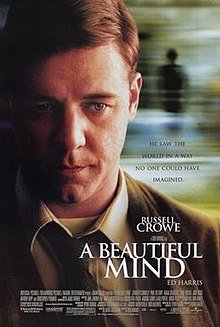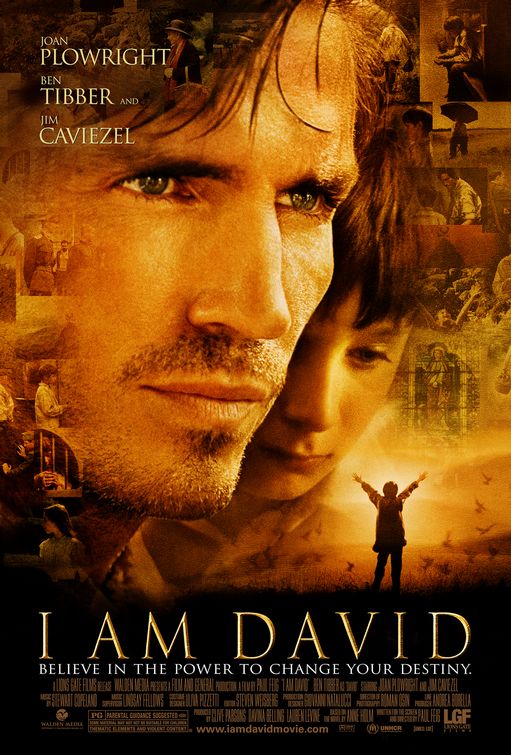"The Darker Side of Genius"
| None | Light | Moderate | Heavy | |
|---|---|---|---|---|
| Language | ||||
| Violence | ||||
| Sex | ||||
| Nudity | ||||
Skip offensive content with  LEARN MORE | ||||
What You Need To Know:
A BEAUTIFUL MIND is incredible. With typical heart-gripping direction by Ron Howard (APOLLO 13), and with the broad acting skills of Russell Crowe, who must age from a college kid to an old man, the movie is masterfully presented. Based on a true story, this is a cleverly-portrayed, but sobering, look into the mindsets of the mentally ill and the healing powers of love.
Content:
(BB, C, H, L, VV, S, AA, D, M) Solid moral worldview contains redemptive elements as wife lays her life down in ultimate commitment to her mentally ill husband; some humanist, elitist, “intelligentia” worldview elements typical of many brilliant, top-educated youths – seen in high-mindedness & arrogance; very mild foul language with 2 obscenities & 1 profanity, though several instances of joking about fornication, etc.; a couple violent scenes include protagonist throwing desk through window in rage, a car chase/shoot-out with bad guys & man gets shock therapy treatments; non-offensive bed scene where wife makes sexual advances toward husband, only to be rejected, mild college-boy joking, speculating about fornication & protagonist tries to pick up co-ed in a bar; no nudity depicted; alcohol use & abuse depicted, smoking depicted; and, theme of mental illness portrayed with disturbing scenes of father leaving baby in tub too long, multiple delusions, shock treatments, & mockery by outsiders.
More Detail:
A BEAUTIFUL MIND is the story of John Nash, a Carnegie Scholarship genius who attends Princeton University in 1947. John is, of course, brilliant, but he lacks social graces and comes across as rude, insensitive, arrogant, and independent. He skips classes to pursue his theories in the natural environment, but his disdain for academic expectations does not sit well with his instructors, one of whom tells him that he’ll likely not be recommended for placement in a coveted internship at Wheeler Laboratories.
His roommate, Charles Herman, challenges the “chips on both of John’s shoulders,” and John confesses that a childhood teacher once told him that he had “twice the brain but half the heart” he needed. John does manage to hang around with a smart group of guys, and they pontificate about how important Math is but say that it will never lead one to higher truth. John admits that he wants to go beyond this limitation and make his life count for something.
John’s personality continues to be abrasive, and when he loses a board game, he storms off, saying the game is flawed. He horribly botches an attempt to pick up a coed in a bar, and his friends laugh at him mercilessly. His professor continues to deny him internships and John continues to be frustrated at not finding his great Mathematical, world-changing breakthrough. In anger, John and his roommate crash a dresser through the dorm window, and it shatters in the courtyard below.
Finally, one night in a bar, John sees his friends ogling five coeds, one of which is a blonde. Suddenly, his eyes light up. He tells them that the theorist Adam Smith was wrong – that decisions should not be based solely on what’s right for oneself, but rather for self AND the group. He suggests that, if they all went for the blonde, her friends would be mad, and they’d all leave. Therefore, in order for everyone to have a great date, it would be better to ignore the blonde and flirt with the other four girls. The guys are amazed, and John quickly applies his new theory to complex, real-world scenarios. After much work, his professor acknowledges the brilliance of Nash’s work, and he does make the Wheeler Lab recommendation.
Years later, at the Pentagon, our Dr. John Nash, part-time mathematical scientist/part time professor at M.I.T., is called upon to decode a radio transmission from Russia. His brain is able to quickly break a complex code involving the latitude and longitude routing orders across the borders of the U.S. A few weeks later, William Parcher, of the Department of Defense, approaches John. Parcher takes him to an impressive, secret U.S. lab, where he shows him how a Russian faction called “New Freedom” has been imbedding secret messages in newspapers and magazines. Parcher asks John to become a spy for the U.S. – scanning magazines and decoding the enemy’s secrets. John agrees and consents to having an electronic chip embedded into his forearm. The chip will have a number code that will change weekly, enabling him to get past security checkpoints and make important mail drops.
John is busy decoding and teaching when he meets a gorgeous grad student, Alicia. She goes out with him and makes him look very good at parties. They share a romantic date in a courtyard under the stars. He asks her to think of any shape she wants, and he is then quickly able to point out the shape in the galaxy. They soon fall in love and get married. John continues decoding and making his top-secret mail drops.
One night, however, the drop is compromised, and it results in a scary car chase with Parcher leading them in a shoot-out where the bad guys’ car goes down into the lake. John makes it out, but he is terrified, and he shuts out his wife. Parcher tells him later, “I told you attachments were dangerous.” Soon, John is so fearful he wants to quit. Parcher threatens him, so John sends the now-pregnant Alicia away to her mother’s house.
One day, while John is lecturing at Harvard, he sees his old roommate, Charles Herman, and Charles’ newly adopted young niece. He tells Charles about his trouble with the spy-game-gone-wrong, and Charles accompanies him to his lecture. During the lecture, however, John sees men in dark suits, coming to get him. He runs, and the bad guys chase him down. They tell him they’re psychiatrists, and they give him a shot to subdue him.
At the psychiatric hospital, he sees Charles, and realizes that his faithful old roommate has betrayed him. They are all trying to kill him now. Or are they?
A BEAUTIFUL MIND is incredible on many levels. With typical Ron Howard (BACKDRAFT, APOLLO 13, GRINCH) heart-gripping direction, and with the broad acting skills of Russell Crowe (GLADIATOR), who must age from a college kid to an old man, the film is masterfully presented. Based on the true story of John Nash, this is a cleverly-portrayed, sobering look into the mindsets of the mentally ill.
It is also the story of how all of heaven rallies to bring an individual out of his off-putting, rough-edged personality to be shaped into the image of God’s true purposes. John Nash moves from abrasiveness to gentleness . . . from haughtiness to humility. At the end he says, “I’ve reached a level of honesty that borders on stupidity.”
On another level, Christians will see the insidious nature of mental illness and the delusional “voices” which to many would constitute demonic activity. It is interesting that once John turns from the voices, acknowledges that they are not his own, and refuses to answer them, he begins to find his healing. Similarly, the Psalmist talks about how the entrance of God’s truth brings light and life. In the movie, John’s doctor tells him, “Like all dreams and nightmares, you’ve got to keep feeding them to keep them alive.” John refuses to keep alive the negative, debilitating thought-life that eventually could lead to death.
The most significant aspect of the film was perhaps the incredible, self-sacrificial commitment demonstrated by John’s wife, Alicia, played by the beautiful Jennifer Connelly. In a day where many, if not most, wives would have crumbled under the weight of caring for a mentally ill spouse, Alicia takes up “her cross” and supports her husband – truly through thick and thin, for better and worse. At the end, John’s Nobel Prize speech is laden with praise for such a faithful companion who persevered under unfathomable trials. He ends with, “Only in the mysterious equation of love can the logical be found.”
The only negatives in the film were the few sexual references and the disturbing portrayal of mental illness. The middle of the film felt a bit tedious and nerve-wracking, but the ending delivers a fine payoff. This movie will likely give great hope and help to those suffering from mental, spiritual and even academic challenges.
Now more than ever we’re bombarded by darkness in media, movies, and TV. Movieguide® has fought back for almost 40 years, working within Hollywood to propel uplifting and positive content. We’re proud to say we’ve collaborated with some of the top industry players to influence and redeem entertainment for Jesus. Still, the most influential person in Hollywood is you. The viewer.
What you listen to, watch, and read has power. Movieguide® wants to give you the resources to empower the good and the beautiful. But we can’t do it alone. We need your support.
You can make a difference with as little as $7. It takes only a moment. If you can, consider supporting our ministry with a monthly gift. Thank you.
Movieguide® is a 501c3 and all donations are tax deductible.

Now more than ever we’re bombarded by darkness in media, movies, and TV. Movieguide® has fought back for almost 40 years, working within Hollywood to propel uplifting and positive content. We’re proud to say we’ve collaborated with some of the top industry players to influence and redeem entertainment for Jesus. Still, the most influential person in Hollywood is you. The viewer.
What you listen to, watch, and read has power. Movieguide® wants to give you the resources to empower the good and the beautiful. But we can’t do it alone. We need your support.
You can make a difference with as little as $7. It takes only a moment. If you can, consider supporting our ministry with a monthly gift. Thank you.
Movieguide® is a 501c3 and all donations are tax deductible.




 - Content:
- Content: 




